Conductor / Composer Esa - Pekka
Salonen
A Conversation with Bruce Duffie
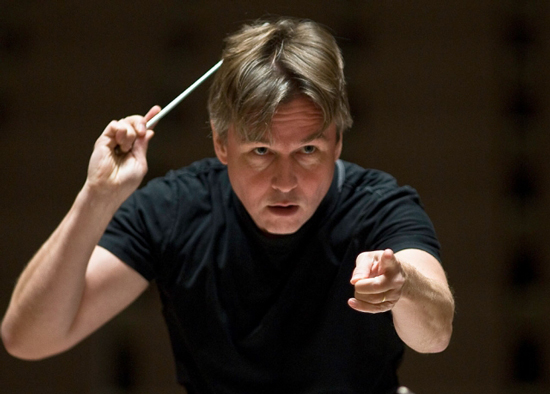
This conversation is from the very beginning of 1988, a year before
Salonen was offered the Guest-Conductorship of the Los Angeles Philharmonic.
He had already conducted there, but the twenty-year impact of this
collaboration was still on the horizon.
A multi-faceted musician, his focus is mainly on two overlapping tasks
— conducting and composition. Each
feeds the other, and together they propel his ongoing legacy.
After reading this interview, one comes away feeling that this man
is not only a superb musician, but also a deep thinker who can express those
ideas in a manner that communicates with everyone and anyone.
In 1988, Salonen was making his debut with the Chicago Symphony doing
the Nielsen Fourth Symphony. He would return several times
to conduct the Orchestra, and would also bring an all-Scandinavian program
with his Swedish Radio Orchestra just two months after that CSO debut.
Here is what was said that afternoon . . . . . . . . .
Bruce Duffie: Being Scandinavian, do you feel
a special passion to bring the music from Scandinavia all over the world?
Esa-Pekka Salonen: It’s not the geographical
aspect which is the vital one. For me it’s basically that I want
to conduct music that I like, and which I feel comfortable with.
Nielsen and Sibelius just happen to be those sort of composers.
BD: With this vast repertoire from three centuries
of symphonic music, how do you decide which pieces you will conduct and
which pieces you will set aside?
E-PS: Often it’s a lot of guessing because you
don’t really know whether this piece is good for you or not until you
have conducted it at least once. Sometimes there are pieces which
need fifteen performances so that you really are comfortable with the
music. So when I see score which excites me, then I try to program
it somewhere, and after the first performance I know a lot more about
my relationship to that piece.
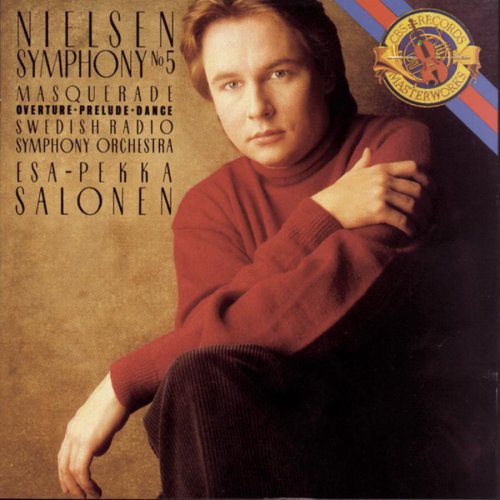 BD: There must be some things you look for in the score
to give you a clue that this will excite you or that will not excite
you.
BD: There must be some things you look for in the score
to give you a clue that this will excite you or that will not excite
you.
E-PS: Yes, but there’s no rule really what sort
of things do excite me because a lot of the most exciting things in music
are not really possible to explain in verbal means. So it’s difficult
to describe what is the element that excites you.
BD: Do you find that most of the pieces you are
doing — the pieces that do excite you
— are masterworks?
E-PS: No, not necessarily. There’s also
this curiosity aspect. Sometimes it’s nice to conduct music which
is very seldom played and very seldom heard, and which doesn’t belong to
the most central repertory. Sometimes it’s music which certainly doesn’t
belong to the real list of masterworks, but that serve an important function
as well.
BD: Do you look for a balance in each of your
concerts with a masterwork, and maybe something of lesser importance?
E-PS: Basically I don’t conduct music that I don’t
believe in. So even if the title ‘masterwork’ doesn’t apply, I avoid
conducting music which I think is not over-high in artistic value.
BD: Is the public right when it decides that something
is what they want to hear again and again, or when it’s something they
don’t ever want to hear again?
E-PS: Not always. There are lots of examples
of wrong judgments from both the critics and the audiences during musical
history. If you think about composers such as Mozart, Beethoven,
Bruckner, Mahler, those are people whose greatest works basically gained
that popularity after their death. So the immediate public reaction
is not always something you can rely on.
BD: Do you feel it’s your job to convince the
public about the other works for which you feel passionately?
E-PS: Not necessarily to convince, but my function
partly is to give an alternative, to let the audience have a chance to
get to know some of these works which I believe in and I’m excited about,
and which do not necessarily belong to the central mainstream repertory.
BD: What do you feel is the ultimate purpose of
music in society?
E-PS: [Ponders a moment] I don’t think I’m
able to answer to that question in that form. Music is basically
a biological need in a human being, and as such it doesn’t necessarily
have a purpose in the sense of gaining something because it’s about a biological
phenomenon. In every culture during human history, mankind has had
some sort of musical culture. That tells us about the universal
importance of music, but it doesn’t answer the question of what one possibly
gains by playing or listening to music. So it’s a difficult question.
In our society now, one of the most important functions for classical music
is that it tells us about our connection to the past, and also, in a way,
tells us about our connections with the future. If we have an institution
which is as impractical and as inefficient and as expensive as a symphony
orchestra, the fact that it still exists very intensely and has audiences
that are growing, there has to be an important message somewhere.
One of the most important things is that playing music from the Classical
period, for instance, can show that something that was written two hundred
years ago, or three hundred years ago can still be vital and exciting today.
It tells us that we have our place in the history of this civilization.
So I think that is the primary function of classical music at the
moment.
* * *
* *
BD: Is there any real difference in the music that
comes out of Scandinavia from the music that comes out of Western Europe,
or Eastern Europe or the United States?
E-PS: The most characteristic thing about Scandinavian
music, especially Finnish music, is the fact that it’s culturally between
Western Europe and Eastern Europe. So in Sibelius you can hear
influences from both sides. Finland happens to be in the middle
of the Byzantic and the Catholic culture influence, so it’s basically
a place where East and West meet. That might be a special characteristic
of Scandinavian music. Of course, nowadays the contemporary music
which is composed in Scandinavia has lost its national cultural identity
in the sense that you cannot anymore hear whether these pieces are composed
in Tokyo, or in New York, or in Copenhagen, or in Berlin. The musical
language has become more universal because of the mass-media and the global
communication.
BD: Is it a good thing or a bad thing that we’re
losing this identity?
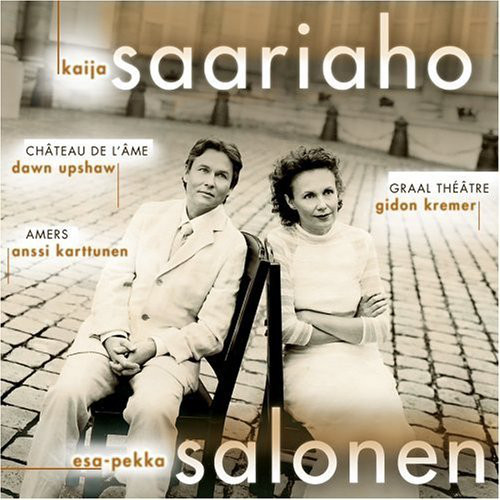 E-PS: The good thing about it is that the musical communication
beyond the limits of language is easier, so there can be more musical exchange
between different cultures without having big syntax problems. But
also it’s a pity that different countries lose their personal characteristics.
With all these satellite TV channels and videos and things there’s
a danger that our whole culture will become more impersonal and colorless
as a result of all these commercial mass-communication systems.
E-PS: The good thing about it is that the musical communication
beyond the limits of language is easier, so there can be more musical exchange
between different cultures without having big syntax problems. But
also it’s a pity that different countries lose their personal characteristics.
With all these satellite TV channels and videos and things there’s
a danger that our whole culture will become more impersonal and colorless
as a result of all these commercial mass-communication systems.
BD: Do you feel that classical music should not
be marketed the way other kinds of popular media are?
E-PS: I don’t know. Sometimes I feel that
the only chance for classical music to survive is to fight the commercial
music with the same weapons — the same hype, the
same artificial star-cult — but I’m not always sure.
Sometimes I feel that one shouldn’t touch that sort of ideology at all,
and just let classical music be interesting because of its own artistic
value. But it’s difficult to tell. Obviously, mass-media is
the most efficient way to reach people, so why not to use it? [Vis-à-vis
the recording shown at left, see my Interviews with Dawn Upshaw, and Gidon Kremer.]
BD: Then where, for you, is the balance between
the entertainment value and the artistic achievement in classical music?
E-PS: It’s difficult to tell because people have
different reasons why they go to concerts and why they buy records.
But I feel that a contemporary music concert is less entertainment and
more cultural excitement than a popular classical concert with a major
orchestra and a major conductor and a major soloist. But that doesn’t
necessarily mean the artistic value of contemporary music goes this higher,
so an interesting artistic event is a mixture of those two aspects
— provocation and fulfilling of spiritual needs.
BD: Do you feel any special commitment to yourself
towards contemporary music or new works?
E-PS: Yes. Almost fifty per cent of my repertory
is music which has been composed during the last two decades.
BD: Will it continue to be? Are you going
to continue to search out new scores for the rest of your career?
E-PS: Yes. I’m more and more convinced
about the importance of contemporary music, and that’s my number one field
of interest. For me it’s the most natural way to communicate with
my own time, with my own society — to perform works
that have been written recently — which doesn’t
mean that I don’t like and love all these old masterpieces. But somehow,
I feel in the cultural environment, the musical environment, today there’s
no balance between historical music and contemporary music. This
is a well-known fact, of course, but when Brahms was active as a composer,
all the symphony concerts were contemporary music concerts. No
one ever played ‘old music’. It was a really rare event. When
Mendelssohn did his first Bach performances, it was unheard of. Something
happened in the beginning of this [twentieth] century so all the concert
programs became more conservative and conventional. I think it’s
not really a healthy situation. Somewhere there’s this gap between
the audience and the composers, and I don’t really know why it didn’t
exist before and why it exists now.
BD: What advice do you have for composers who
are writing today?
E-PS: [Thinks a moment] Actually I wouldn’t
advise so much composers. I would rather advise orchestras, and
also orchestra managers, and conductors, and critics, and record companies
to help these people who write music today. There’s a lot of good
music being written today all over the world. It doesn’t get enough
publicity, and it doesn’t reach enough audience because of all these conventions
and all these commercial aspects. Actually in composers we have a
potential which we don’t use.
BD: So you’re urging them just simply to write
more?
E-PS: Yes. What I’m saying to composers
is keep on composing. It’s our responsibility as conductors, performers,
musical organizers, and agents and so forth to make this music known.
BD: What advice do you have for the audience
who comes to hear a piece of new music?
E-PS: If they already come to hear a piece of new
music on the program, that audience is already enlightened. So
to those people I have nothing to say, just to congratulate them.
But audiences basically believe what the mass-media says if
it’s written in a convincing way. So it’s
basically that the programs reflect the bad communication between mass-media
and the creative artist today.
* * *
* *
BD: You make quite a lot of recordings. Do
you conduct any differently in the recording studio than you do in the
concert hall?
E-PS: I believe so, yes, because I don’t feel that
a good recording is a substitute for a concert. Ideally a good
recording is something else. It’s a different form of art, and
in this sense Glenn Gould is one of my recording heroes because he had
the courage to use the media in a way which was unheard of before. There
are not that many people who’ve done that sort of thing since, either.
My readings in the recording studios are more analytical, more provocative,
and perhaps a little bit more clinical.
BD: Not enough heart?
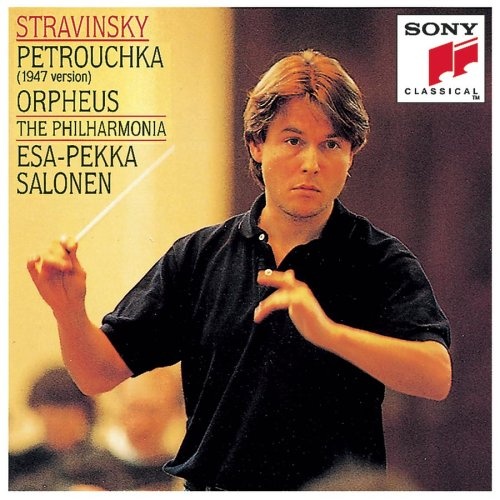 E-PS: No, I don’t believe in the polarity of heart and
brain in music. It’s a superficial analysis to divide musical personalities
into two groups — heart and brain — because
it’s too simple to be true. But I feel that the recording should
reveal something of a piece of music which doesn’t necessarily come out
in a concert situation, and ideally it would convey something which offers
a new aspect to that particular work.
E-PS: No, I don’t believe in the polarity of heart and
brain in music. It’s a superficial analysis to divide musical personalities
into two groups — heart and brain — because
it’s too simple to be true. But I feel that the recording should
reveal something of a piece of music which doesn’t necessarily come out
in a concert situation, and ideally it would convey something which offers
a new aspect to that particular work.
BD: Do you ever feel that you’re competing against
your recording when you’re conducting a concert of the same music?
E-PS: Not really because my starting point is
a little bit different when I conduct the concert. In a concert
you also create an atmosphere. It’s a communication situation between
the orchestra and the audience, and between the conductor and the orchestra,
whereas in a recording it’s only a one-way communication. A concert
is a trial drama, so to speak, so it’s entirely different for me.
BD: When you’re preparing a symphony concert,
do you do all the work in rehearsal, or do you leave a little bit for
that spark of inspiration at the actual performance?
E-PS: This depends. Actually I would rather
not leave anything for the concert [bursts out laughing] but as we almost
never get enough rehearsal time in order to really work meticulously on
every possible detail, there’s always something left to the concert as
well. There are always some unsolved moments, and it might be an
advantage sometimes. But sometimes it clearly isn’t, so it depends.
Sometimes I rather enjoy doing very difficult works with very little rehearsal
time — if the orchestra is good enough.
BD: Do you adjust your conducting style at all
for the size of the house — large house, small house?
E-PS: That is something I haven’t really thought
of. It might be true. [Thinks a moment] It might have
a certain effect on tempi and so forth, but I haven’t really thought
of it. The auditory response you get when you are conducting a piece
of music has a certain of effect on your next move. Your rehearsal
actually controls the next moment of making a decision of tempo, or phrasing,
but since a lot of those things happen in the basic nerve system instead
of cortex, it’s difficult to tell how much one adjusts.
BD: Have you done any opera at all?
E-PS: Very little. The only real opera
production I’ve done thus far was Wozzeck in Stockholm in ’84.
There were fifteen performances of a new production, and I haven’t done
any other operas except a couple of productions for the Swedish TV.
My next opera production is going to be next year in Florence at the Maggio
Musicale of Pelléas and Mélisande.
BD: Do you want to do a little more opera, or
do you find you just don’t have time for it? Or is it something that
doesn’t really interest you?
E-PS: Actually it does interest me. It’s
a question of planning, and also a question of time. I had a little
frustrating experience from my first opera production as I didn’t always
have the same players in my performances as I had in my rehearsals, and
in a piece like Wozzeck, it certainly does a lot of harm. So
immediately after those performances, I decided never again if I’m not
able to get different contracts. Now in Florence they promise that
I would have exactly the same players from the first rehearsal to the last
performance. So that’s why I thought it would be nice to try again.
Also the piece is one of my very favorite musical works, so I’m quite
excited about it.
BD: Are there some pieces that you like to play
over and over again, so you re-program them many times?
E-PS: Yes. It’s also a practical question
because there has to be a certain limit for your repertory. The
number of works you do in a season cannot be unlimited in terms of having
the necessary time for study. So you have to limit your repertory.
So there are some works that I conduct over and over again. Actually,
I had this funny experience. Sibelius’s Fifth Symphony is
one of those works I’ve conducted a lot lately, and last year in Los Angeles
I did three performances of it, and afterwards the orchestra manager told
me that the durations of all three performances happened to be identical
within three seconds.
BD: Does that make you happy?
E-PS: No, actually scares me a little bit because
then you will have reached the state where you function like a machine.
You’re not anymore a creative unit if you reach this sort of a scientific
accuracy in your tempi. So then I decided to leave that symphony
for a couple of years, and take it to my desk again to re-study and see
what I think about the work after a break.
BD: Will you come to it with a clean score?
E-PS: Yes, I’ll buy a new one without my old markings.
So now Sibelius Five is on sabbatical at the moment.
* * *
* *
BD: Do you like working with an orchestra for just
a week or two weeks at a time, and then moving onto the next orchestra
for a week or two weeks?
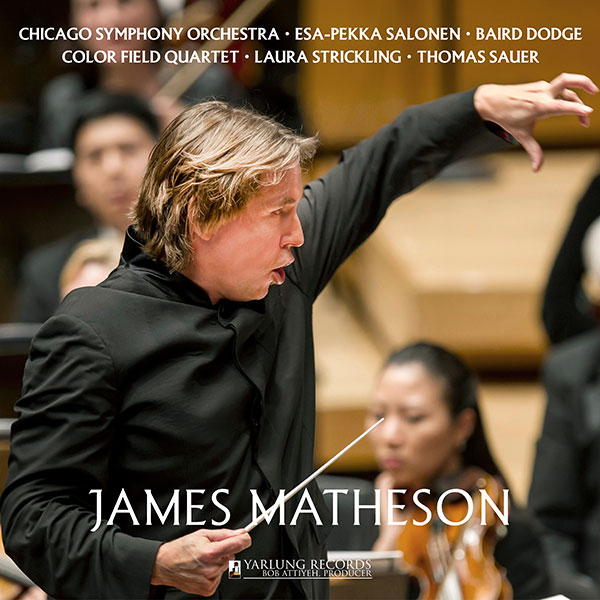 E-PS: That is actually something I am trying to avoid,
so I’m doing less and less pure guest conducting in the future. Typically
what happens is that you meet an orchestra and you play three or four
concerts with them. Then in the last concert, or the penultimate
concert, you feel you have actually reached a level of communication which
could be a good starting point, and then you’ve got to move to the next
place. So that is something which not artistically very satisfactory
in the long-run. It might be exciting, it might be interesting
— especially now when I meet orchestras like the Chicago Symphony,
or the Berlin Philharmonic. That’s always an exciting experience even
if you don’t reach the ideal state of communication during such a short
time. But in the future, I’ll guest conduct less and concentrate
more on a fewer number of ensembles, like four or five orchestras.
E-PS: That is actually something I am trying to avoid,
so I’m doing less and less pure guest conducting in the future. Typically
what happens is that you meet an orchestra and you play three or four
concerts with them. Then in the last concert, or the penultimate
concert, you feel you have actually reached a level of communication which
could be a good starting point, and then you’ve got to move to the next
place. So that is something which not artistically very satisfactory
in the long-run. It might be exciting, it might be interesting
— especially now when I meet orchestras like the Chicago Symphony,
or the Berlin Philharmonic. That’s always an exciting experience even
if you don’t reach the ideal state of communication during such a short
time. But in the future, I’ll guest conduct less and concentrate
more on a fewer number of ensembles, like four or five orchestras.
BD: From your point of view, what is the real
difference between a group such as the Chicago Symphony and maybe a group
of lesser renown? Is it just the technical perfection, or is there
something more?
E-PS: Each orchestra has its own personality, of
course. It’s a thing which is very difficult to describe, but the
Chicago Symphony is like a racehorse in the sense that to get a good result
from such an orchestra you don’t have to force things. Actually you
shouldn’t ever force things. You should just use small gestures and
just give hints and impulses instead of having a rigid type of command over
the players. Here you can give a lot of freedom to the players because
they have this discipline and they have this tradition. They know exactly
what to do, so it is different conducting an orchestra like the Chicago Symphony
from many other orchestras. Elsewhere the artistic level, the technical
level of the individual players might be as high or even higher, but there’s
not the same sort of discipline, not the same sort of unified musical thought.
So it is different.
BD: When you’re doing a concerto, whose ideas
override — your ideas or the soloist’s?
E-PS: The soloist’s because in most of the cases
the soloist has played the piece five hundred times, and I’m doing it for
the fifth time, or for the first time. Also, for a soloist who is
on tour with a piece which he plays over and over again, it’s much more difficult
for him to adjust to the conductor’s ideas. For a conductor it’s much
easier to adjust because it’s not a technical problem. You have to
be flexible in mind, whereas the soloist has to make different technical
solutions if there are different ideas about tempi and so forth.
BD: Do you enjoy accompanying concertos?
E-PS: Most of the time, yes, but of course there
are situations when you have a soloist who thinks completely differently,
and there’s no rapport whatsoever. Things can get very difficult,
but that doesn’t happen often.
BD: Then do you make sure you don’t work with
that soloist again?
E-PS: Perhaps, but even so, a professional musician
should be able to adjust. Even if it makes you mad, you should
be able to do it anyway.
BD: Is there anything you should not be expected
to do?
E-PS: [Ponders the question] From whose
point of view?
BD: We seem to have a picture of conductors as
being supermen. They can do anything, they can conduct anything, they
can bring anything to life.
E-PS: [Smiles] Well, this depends very much
as your mood varies from day to day. You’re doing basically the
same things with different orchestras, and the communication works in different
ways, so there are no safe cards, so to speak. There are no things
which are doomed to failure beforehand, so this is always something which
is flexible. But I know there are some composers who clearly are
more difficult for me than some other composers, and although in certain
cases I do like the music a lot, I just keep away from them myself.
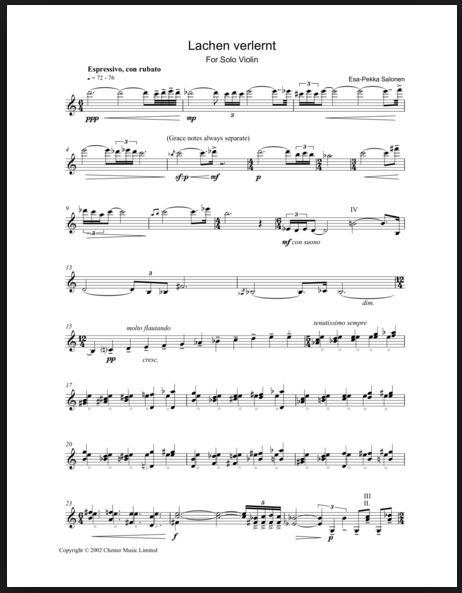 BD: Is conducting fun?
BD: Is conducting fun?
E-PS: Most of the time, yes. The actual
act of conducting is mostly fun, but the sort of life which is the result
of having an international conducting career is not always as fun as the
conducting itself.
BD: Is it worth the sacrifices?
E-PS: Thus far I feel so, but in the future I’m
going to cut down my conducting weeks to get more time for my composition
work, and also more time for human life.
BD: You’re also a composer?
E-PS: Yes, that was my main subject in school,
actually. I’m trying to keep up with it, even though I am conducting
forty-five weeks a year. It’s difficult, so that’s one of the reasons
I’m going to cut down in the future.
BD: Do you feel that your compositions are perhaps
better because you are such an experienced orchestral director?
E-PS: I haven’t written anything for orchestra
since I started to conduct full-time. I’ve written some chamber
music, solo works, and a little electronic music, so that’s about all.
It’s simply a question of time because to write an orchestral score takes
so much time and needs so much concentration and energy that, at least for
me, it’s impossible to do while you are touring and when you’re not in
one place for a longer period.
BD: If you’re really a composer, why would you
get into conducting?
E-PS: I thought it might be useful for a composer
to know something about conducting, so I took conducting as a second
subject. Later on I realized that conducting was a good way to survive,
because as a composer you don’t survive in economic terms. I conducted
some contemporary music concerts, and conducted my own works, and so forth.
Then I got more conducting jobs, and I was appointed as a guest conductor
at the Finnish National Opera. After that I conducted in Stockholm,
and also Copenhagen, and then finally in London and in Los Angeles. So
I gradually realized that I was a full-time conductor. But I never
had any intention of being a full-time Kapellmeister.
BD: So then you relish the time that you can
spend composing?
E-PS: Yes.
BD: Are you the ideal interpreter of your music
when you conduct your own works?
E-PS: No. not at all. Actually I realized
several times that I become a very amateurish conductor when I’m conducting
my own music because there’s too much happening inside of your brain. In
that very moment when you rehearse your own works you hear music which
is basically very close to something you dreamed of, but it is not necessarily
exactly the same. So you start thinking whether the problem is in
the playing or in your conducting; whether the problem is your instrumentation
or were you not able to convey your ideas in musical notation. Then
you actually forget about the rehearsals and think about think other things.
So I prefer sitting in the audience listening, and have someone else conduct
my works. That has happened a couple of times, which is very nice.
I can even have a drink before the performance. [Laughs]
* * *
* *
BD: Where’s music going to day?
E-PS: [Laughs] It’s difficult to tell because
at the moment there are no major schools anywhere. In the ’50s
and early ’60s, you could always tell that there’s
this Darmstadt school, and there’s this other group which is not Darmstadt,
and that was basically the two polarities. Now there’s no such
a thing anymore, and so the whole thing is more diffused than ever, which
is nice, I think. There are even no pure minimalists anymore; there
are no pure serialists anymore. The computer is very strongly
there now — at least in Europe and in this country,
as well in certain other places. People do remarkable musical things
with computers, and the musical phenomenon of the ’80s
in musical history will probably be the digital synthesizers which make
digital sound synthesis possible for anyone. Now that micro-computers
can control all these digital synthesizers, that opens completely new
horizons for the development of electronic music that’s vital and revolutionary.
BD: Is there any chance there are perhaps too
many young composers coming along?
E-PS: I don’t know. It’s difficult to measure
what’s a right amount of composers for a culture. There is this Darwinist
mechanism of letting the strongest continue. [Laughs] It sounds
a little bit fascist, but it might be the case. In Europe, especially
Scandinavia, the public interest towards contemporary music and young composers
is perhaps growing at the moment. I don’t know really what is happening
in this country. It might be different. It is basically different
because this is a country of separate mini-cultures. The California
composers don’t necessarily know that much about the East Coast people,
and so this country’s divided into smaller cultural areas.
BD: Are you optimistic about the future of music?
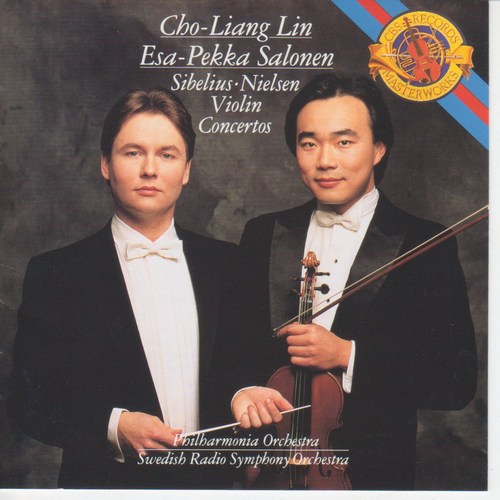 E-PS: Yes, I am, actually. Otherwise I would do
something else if I didn’t feel there was a future for all this I’m doing
at the moment.
E-PS: Yes, I am, actually. Otherwise I would do
something else if I didn’t feel there was a future for all this I’m doing
at the moment.
BD: Tell me about the program you’re bringing in
a few weeks with your Swedish Radio Orchestra.
E-PS: The first piece is by a Swedish composer,
Karl-Birger Blomdahl (1916-1968), a piece called Forma Ferritonans.
Blomdahl was one of the most important modernists in the ’50s
and the ’60s.
BD: Did you ever conduct Aniara [the opera
set aboard a space ship headed for Mars]?
E-PS: No, but that was basically the most important
Scandinavian opera from the ’50s, and is probably
still the most important Scandinavian opera after the Second World War.
That was his main work. [Soprano Elisabeth Söderström,
who sang the leading role, speaks of this work in my interview with her.]
This piece we are bringing to Chicago – Forma Ferritonans
was written for a steel factory. They had an anniversary of some
kind, and they commissioned a piece by Blomdahl. It has a very steely
character, so it’s very exciting piece. Then the second piece in
the program is the Violin Concerto by Nielsen, played by Cho-Liang
Lin. It’s not a very well-known work but it’s gaining more popularity
— at least in Europe at the moment — and
after this tour we are going to record it. That recording is going
to be coupled with the Sibelius Violin Concerto. Then after
a break, we will play the Sibelius First Symphony. So it’s
an all Scandinavian program.
BD: Do you prefer to record music that you’ve
played in the concert hall?
E-PS: Oh, yes, always. That’s important in terms
of sheer rehearsal time because an orchestra learns a lot more about
the piece in a concert than they actually do in a rehearsal. It’s
such a different state of mind, such a different concentration.
BD: You can’t duplicate that in rehearsal?
E-PS: I cannot. I would imagine that some
sort of genius conductor like Carlos Kleiber can
make his rehearsals as interesting as concerts, but I have my doubts.
BD: Will you be back with the Chicago Symphony again?
[Remember, this interview was done at the time of his debut with
the Orchestra.]
E-PS: I hope so. We haven’t actually spoken
about it, but let’s see what happens.
BD: Have you been pleased with what you’ve been
hearing so far?
E-PS: Oh, yes. It’s been a tremendous experience,
and I enjoyed the collaboration very much. Although it’s world-famous
and very prestigious, the orchestra is very flexible, and has sort of
easy-going people as well. So I enjoyed it very much on a personal
level, too.
BD: Thank you for coming to Chicago, and for spending this
time with me today.
E-PS: Thank you.
=======
======= =======
--- --- --- ---
======= =======
=======
© 1988 Bruce Duffie
This conversation was recorded in Chicago on January 16, 1988.
Portions were broadcast on WNIB two months later, and again in 1993
and 1998; and on WNUR in 2003, 2007, and 2009. This transcription
was made in 2017, and posted on this website at that time. My
thanks to British soprano Una Barry for her
help in preparing this website presentation.
To see a full list (with links) of interviews which have been transcribed
and posted on this website, click here.
Award -
winning broadcaster Bruce Duffie was with WNIB, Classical
97 in Chicago from 1975 until its final moment
as a classical station in February of 2001. His
interviews have also appeared in various magazines and journals
since 1980, and he now continues his broadcast series on WNUR-FM.
You are
invited to visit his website
for more information about his work, including
selected transcripts of other interviews, plus a full
list of his guests. He would also like to call your
attention to the photos and information about his grandfather,
who was a pioneer in the automotive field more than a century ago.
You may also send him E-Mail
with comments, questions and suggestions.


 BD: There must be some things you look for in the score
to give you a clue that this will excite you or that will not excite
you.
BD: There must be some things you look for in the score
to give you a clue that this will excite you or that will not excite
you. E-PS: The good thing about it is that the musical communication
beyond the limits of language is easier, so there can be more musical exchange
between different cultures without having big syntax problems. But
also it’s a pity that different countries lose their personal characteristics.
With all these satellite TV channels and videos and things there’s
a danger that our whole culture will become more impersonal and colorless
as a result of all these commercial mass-communication systems.
E-PS: The good thing about it is that the musical communication
beyond the limits of language is easier, so there can be more musical exchange
between different cultures without having big syntax problems. But
also it’s a pity that different countries lose their personal characteristics.
With all these satellite TV channels and videos and things there’s
a danger that our whole culture will become more impersonal and colorless
as a result of all these commercial mass-communication systems.
 E-PS: No, I don’t believe in the polarity of heart and
brain in music. It’s a superficial analysis to divide musical personalities
into two groups — heart and brain — because
it’s too simple to be true. But I feel that the recording should
reveal something of a piece of music which doesn’t necessarily come out
in a concert situation, and ideally it would convey something which offers
a new aspect to that particular work.
E-PS: No, I don’t believe in the polarity of heart and
brain in music. It’s a superficial analysis to divide musical personalities
into two groups — heart and brain — because
it’s too simple to be true. But I feel that the recording should
reveal something of a piece of music which doesn’t necessarily come out
in a concert situation, and ideally it would convey something which offers
a new aspect to that particular work.  E-PS: That is actually something I am trying to avoid,
so I’m doing less and less pure guest conducting in the future. Typically
what happens is that you meet an orchestra and you play three or four
concerts with them. Then in the last concert, or the penultimate
concert, you feel you have actually reached a level of communication which
could be a good starting point, and then you’ve got to move to the next
place. So that is something which not artistically very satisfactory
in the long-run. It might be exciting, it might be interesting
— especially now when I meet orchestras like the Chicago Symphony,
or the Berlin Philharmonic. That’s always an exciting experience even
if you don’t reach the ideal state of communication during such a short
time. But in the future, I’ll guest conduct less and concentrate
more on a fewer number of ensembles, like four or five orchestras.
E-PS: That is actually something I am trying to avoid,
so I’m doing less and less pure guest conducting in the future. Typically
what happens is that you meet an orchestra and you play three or four
concerts with them. Then in the last concert, or the penultimate
concert, you feel you have actually reached a level of communication which
could be a good starting point, and then you’ve got to move to the next
place. So that is something which not artistically very satisfactory
in the long-run. It might be exciting, it might be interesting
— especially now when I meet orchestras like the Chicago Symphony,
or the Berlin Philharmonic. That’s always an exciting experience even
if you don’t reach the ideal state of communication during such a short
time. But in the future, I’ll guest conduct less and concentrate
more on a fewer number of ensembles, like four or five orchestras. BD: Is conducting fun?
BD: Is conducting fun?  E-PS: Yes, I am, actually. Otherwise I would do
something else if I didn’t feel there was a future for all this I’m doing
at the moment.
E-PS: Yes, I am, actually. Otherwise I would do
something else if I didn’t feel there was a future for all this I’m doing
at the moment.